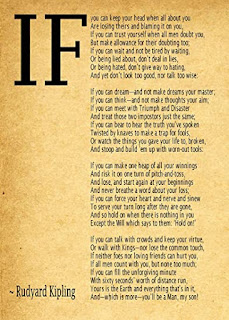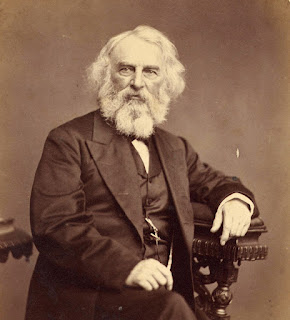If— by Rudyard Kipling
Rudyare Kipling was born in Bombay, India, on 30 December 1865. In 1870, Kipling was taken back to England to stay with a foster family in Southsea and then go to boarding school in Devon. In 1882, He returned to India and worked as a journalist, writing poetry and fiction in his spare time. Books such as 'Plain Tales from the Hills' (1888) gained success in England, and in 1889 Kipling went to live in London. Kipling was an English writer and winner of the Nobel Prize for Literature. He is best known for his poems and stories set in India during the period of British imperial rule. Kipling died on 18 January 1936 and is buried at Westminster Abbey.
‘If—' is an inspirational poem that provides advice on how one should live one’s life. The poem takes the reader through various ways in which the reader can rise above adversity that will almost certainly be thrown one’s way at some point.
Summary
Throughout the poem, the speaker gives the reader multiple scenarios, both positive and negative, along with a glimpse into how one should conduct oneself. The poem has an almost mathematical proof about it with its if-then scenario. Kipling leaves the "then" until the final two lines, revealing to the reader that if he or she is able to do all that was just mentioned, he or she will not only have the world at his or her fingertips, but he or she will also be a "Man".
If—
If you can keep your head when all about you
Are losing theirs and blaming it on you,
If you can trust yourself when all men doubt you,
But make allowance for their doubting too;
If you can wait and not be tired by waiting,
Or being lied about, don't deal in lies,
Or being hated, don't give way to hating,
And yet don't look too good, nor talk too wise:
If you can dream—and not make dreams your master;
If you can think—and not make thoughts your aim;
If you can meet with Triumph and Disaster
And treat those two impostors just the same;
If you can bear to hear the truth you've spoken
Twisted by knaves to make a trap for fools,
Or watch the things you gave your life to, broken,
And stoop and build 'em up with worn-out tools:
If you can make one heap of all your winnings
And risk it on one turn of pitch-and-toss,
And lose, and start again at your beginnings
And never breathe a word about your loss;
If you can force your heart and nerve and sinew
To serve your turn long after they are gone,
And so hold on when there is nothing in you
Except the Will which says to them: 'Hold on!'
If you can talk with crowds and keep your virtue,
Or walk with Kings—nor lose the common touch,
If neither foes nor loving friends can hurt you,
If all men count with you, but none too much;
If you can fill the unforgiving minute
With sixty seconds' worth of distance run,
Yours is the Earth and everything that's in it,
And—which is more—you'll be a Man, my son!
Rudyard Kipling
Life will challenge you - physically, mentally, emotionally, and spiritually. This poem calls out for you to endure, keep going through, and rise above the adversity you will face.
It inspires, it motivates, it provides an example to follow. It's like a recipe for life - and it provides a most satisfying meal.
Sources >>




Thanks for your informations. I've known one of the noble prize winner really thanks to you "<3.
ReplyDeleteThanks ❤️
ReplyDeleteOne.
ReplyDeleteTwo.
DeleteSimple but really interesting
ReplyDeleteYou always bring interesting blogs to us . We appreciate that a lot . Keep going.
ReplyDeleteReading a blog about a writer is always inspired to me. Thanks a lot.
ReplyDeleteThanks for sharing.
ReplyDeleteSpecial thanks for all PDF & Clicker.
We must win.
✊🏻✊🏻🤲🏻💪🏻💪🏻💪🏻
ReplyDelete“ ဆန္ဒဝတော ကိံနာမ ကမ္မံ န သိဇ္ဈတိ၊ ဝီရိယဝတော ကိံနာမ ကမ္မံ န သိဇ္ဈတိ ”
*** ပြင်းပြသော ဆန္ဒ ဝီရိယနဲ့ ပြုလုပ်တဲ့ အလုပ်မှန်သမျှ မအောင်မြင်တာ မရှိ ***
~ There are no unsuccessful things which are done with strong desire and effort ~
Well Done 💪
ReplyDeleteFight for democracy ✊
ReplyDeleteWhat about his 1890 poem "the road to Mandalay"?
ReplyDeleteHis famous statement about Burma in 1896 "This is Burma, and it is quite unlike any land you know about."
ReplyDeleteThis comment has been removed by the author.
ReplyDeleteWe must win.
ReplyDeletewe must
ReplyDeleteFour.
ReplyDeleteDone
ReplyDeleteThanks for sharing
Thanks🤍
ReplyDeletewe must win
ReplyDeleteFive and six.
ReplyDeleteI am noob.
ReplyDeleteKipling was an English writer and winner of the Nobel Prize for Literature.
ReplyDeleteinteresting
ReplyDeleteWe are clicker.
ReplyDeleteWhat if!
ReplyDeleteGBU
ReplyDeleteFight for democracy ✊
ReplyDeleteCreative poet
ReplyDelete